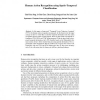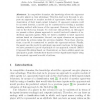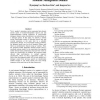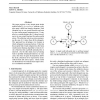3084 search results - page 83 / 617 » Learning to Take Actions |
ACCV
2009
Springer
15 years 6 months ago
2009
Springer
In this paper a framework “Temporal-Vector Trajectory Learning” (TVTL) for human action recognition is proposed. In this framework, the major concept is that we would like to a...
ROBOCUP
2004
Springer
15 years 5 months ago
2004
Springer
In competitive domains, the knowledge about the opponent can give players a clear advantage. This idea lead us in the past to propose an approach to acquire models of opponents, ba...
109
click to vote
HAIS
2010
Springer
15 years 4 months ago
2010
Springer
The recognition of manual actions, i.e., hand movements, hand postures and gestures, plays an important role in human-computer interaction, while belonging to a category of particu...
AICOM
2008
15 years 6 days ago
2008
Since speaker's intentions can be represented into domain actions (pairs of domain-independent speech acts and domain-dependent concept sequences) in goal-oriented dialogues,...
ICML
2003
IEEE
16 years 26 days ago
2003
IEEE
The paper explores a very simple agent design method called Q-decomposition, wherein a complex agent is built from simpler subagents. Each subagent has its own reward function and...




